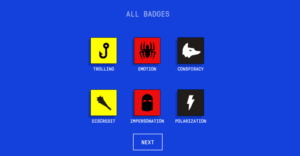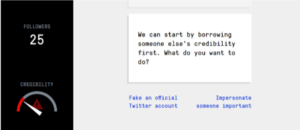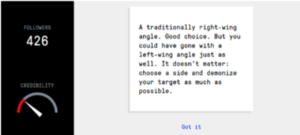Can you take on the role of fake news-monger, ‘[d]rop all pretense of ethics and choose the path that builds your persona as an unscrupulous media magnate’? If so, you should definitely check out Bad News. If not, still do!
Developed by Cambridge Social Decision-Making Lab and media literacy group DROG, Bad News aims to educate people how to better spot fake news. The idea behind it is that once you have used the tactics of those who aim to disinform, you become more resistant.
This comes quite timely after the 2017 news landscape was plagued by fake news. Playing on emotion, fake news has spread widely across social media. As a result trust in platforms has been reduced with more people questioning where truth ends and lies start in today’s media landscape. And this is a very important issue because as Arendt writes in The Origins of Totalitarianism (1951) ‘[t]he Ideal subject of totalitarian rule is […] people for whom the distinction between fact and fiction, true and false, no longer exist.’ Fake news thus becomes a champion of populism and extremism by destroying trust in media as the ‘fourth estate’.
A game like Bad News is a breath of fresh air. If it helps even one person better resist fake news, it has been successful. In the game, you start with a small Twitter account and are prompted to build a following and credibility around an account for fake stories.
After a couple of initial questions, you can choose to respond to a survey and help the people behind the game do research into the consumption of fake news. If you agree, your abilities to spot fake news are tested, and then retested at the end of the game.
Back on the game, you have six levels and you receive a badge after completing each of them: impersonalization, emotion, polarization, discredit, conspiracy and trolling. The game does not discriminate on political beliefs. Right-wing or left-wing, you got through each level and see how news can be exploited for both ends of the spectrum to sow anger and distort facts.
After a couple of bots, well-placed news posts and memes, you win. While it may be scary to think of the impact fake news might have on us, I definitely recommend you checking out this game. It is quick, yet engaging and useful. Let’s stop bad news from spreading!
Antonia Panayotova
(Image courtesy of Digital Trends)




